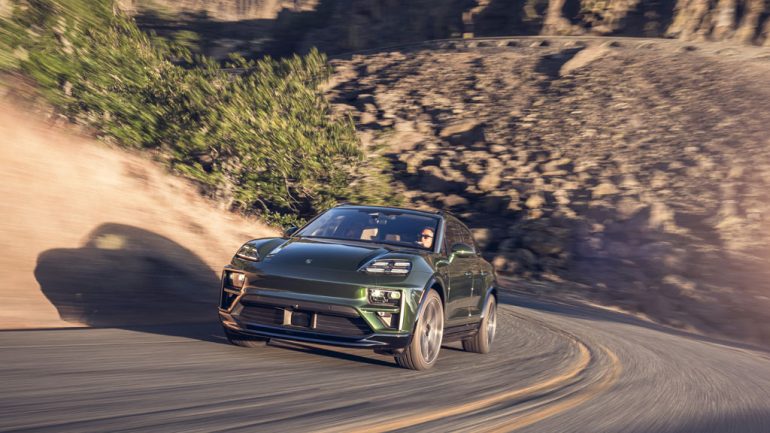
Porsche is known for pushing the boundaries of performance, design, and innovation, so it’s no surprise that the company embraced electric vehicles (EVs) with ambitious targets. Back in early 2022, Porsche set a bold goal, aiming for more than 80% of its global sales to be electric by 2030. Yet, as EV adoption has unfolded at a slower-than-expected pace, especially among the luxury segment’s discerning customer base, Porsche is adjusting its strategy to keep its fans engaged on all fronts. The result? Porsche isn’t just focusing on EVs but is also doubling down on gas and hybrid models for the foreseeable future.
During a recent press Q&A session surrounding Porsche’s Q3 2024 sales report, the brand’s Chief Financial Officer, Lutz Meschke, shared some eye-opening insights. He pointed out that while EV enthusiasm has grown globally, Porsche is still grappling with a “challenging” market in China and a noticeable slowdown in EV adoption across Europe and the United States. In fact, demand for combustion-engine vehicles is proving more resilient than Porsche had anticipated.
Also, don’t forget that you can get discounted new car pricing with a free quote through qualified local dealer partners.
Meschke’s comments signaled a clear trend: many luxury buyers still prefer the visceral experience of a combustion engine, even as electrification becomes more prominent. With these consumer preferences in mind, Porsche has decided to give customers what they want by continuing to refine its gas-fueled models and expanding its lineup of plug-in hybrids.
Rather than committing to a fully electric future, Porsche is giving its Research and Development (R&D) team the green light to work on a variety of powertrain solutions. This includes the potential introduction of combustion-engine variants within traditionally electric-focused platforms. While there’s no guarantee that Porsche’s latest EVs will also offer gas-powered versions, Meschke’s remarks underscore a refreshed commitment to internal combustion engine (ICE) technology.

For example, Porsche’s iconic Cayenne is set to retain its V8 option well into the 2030s, even as a fully electric Cayenne rolls out. The Panamera will also follow this dual-path approach, with electric and gas variants coexisting to cater to varying customer preferences. Meanwhile, Porsche’s upcoming three-row electric SUV, codenamed “K1,” will exclusively feature an electric drivetrain, positioning it to take on the likes of Tesla’s Model X and the upcoming Mercedes EQS SUV in the luxury EV space.
Although Porsche’s flexible approach sounds promising, it’s not without challenges. In Europe, cybersecurity regulations have already forced Porsche to discontinue the Boxster, Cayman, and Macan models, and production of these vehicles will wind down by mid-2025. This limitation highlights a reality Porsche faces with an evolving regulatory landscape that’s increasingly geared toward digital integration and EV-focused standards.
Additionally, adapting EV models to also house combustion engines would require careful design considerations, given the packaging and weight constraints unique to each powertrain type. However, some industry players, like BMW, have successfully implemented a similar multi-powertrain approach. BMW’s Neue Klasse, for instance, is set to launch in 2025 as a versatile architecture that can accommodate both electric and ICE setups.
As Porsche readies its next-generation 718 sports cars—the all-electric Boxster and Cayman duo slated for a 2025 release—the brand’s direction is becoming increasingly clear. In the luxury market, a balanced approach is paramount. Instead of forcing a complete shift to electric, Porsche is giving customers options, recognizing that loyalty to the brand often stems from an appreciation for the sensory appeal of gas engines.
Porsche’s strategy to invest in hybrid technology as a transitional step between gas and electric should also help bridge the gap. For those who aren’t quite ready to part ways with ICE, the enhanced hybrids will offer a compromise of performance, range, and driving experience that a fully electric model may not yet provide.
Porsche’s plan to cater to a broad range of preferences—combining electric, hybrid, and gas-powered models—reveals a brand that’s willing to pivot based on its customers’ wants. By maintaining flexibility, Porsche is not just chasing sales; it’s preserving the heritage of performance and emotion that made it a luxury icon. As Porsche moves toward 2030, the company remains steadfast in delivering driving experiences that appeal to every kind of enthusiast, ensuring that whether it’s the rumble of a V8 or the quiet power of an EV, Porsche drivers won’t have to compromise.